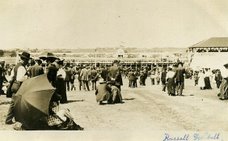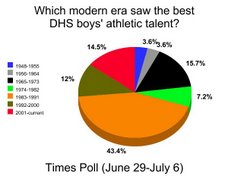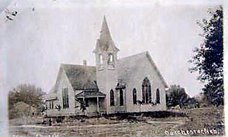 The U.S. Dept. of Agriculture (USDA) has just launched the results of its 2007 census of agriculture. Some of its findings may surprise you.
The U.S. Dept. of Agriculture (USDA) has just launched the results of its 2007 census of agriculture. Some of its findings may surprise you.According to a USDA release, Saline County lost 26 farms from 2002 to 2007, a loss of 4%. The county's average farm size actually fell from 474 acres to 425 acres, a notable shift from recent trends.
About 200 Saline County farms are in the "50-179 acre" category. The second largest category is the "180-499 acre" group. Around 100 Saline County farms claim more than 1,000 acres, while another 100 hold 10-49 acres.
The average Saline County farm has a net farm income of $69,722, according to the census.
The average Saline County farm has seen a decrease in federal farm bill crop subsidies -- from $10,207 in 2002 to $9,293 in 2007. However, county farmers received about $5.6 million in 2007, an 8% increase from 2002.
Saline County ranks 34th of 93 Nebraska counties in corn production; 23rd in soybean production; and 6th in sorghum production. In livestock production, Saline County is 33rd of 93 in hogs and pigs; 83rd in cattle and calves; and 4th in broilers and other meat-type chickens.


















































We cattle boys dont get no government checks.....................................
ReplyDeleteThe subsidies will increase
ReplyDeleteas the remaining small and medium size farms are forced to consolidate. U.S. farm policy has encouraged consolidation since the early 1970's.
Blame FDR and the farm bill of 1933. Of course he also confiscated people's gold.
ReplyDeleteWelcome to Marxism 101.
In fact, farm programs in America were originally created as a way to shrink the great mountain of grain, and for many years they helped to do just that. The Roosevelt administration established the nation's first program of farm support during the Depression, though not, as many people seem to think, to feed a hungry nation. Then, as now, the problem was too much food, not too little; New Deal farm policy was designed to help farmers reeling from a farm depression caused by what usually causes a farm depression: collapsing prices due to overproduction.
ReplyDeleteBasically, the federal government set and supported a target price (based on the actual cost of production) for storable commodities like corn. When the market price dropped below the target, a farmer was given an option: rather than sell his harvest at the low price, he could take out what was called a "nonrecourse loan," using his corn as collateral, for the full value of his crop. The farmer then stored his corn until the market improved, at which point he sold it and used the proceeds to repay the loan.
If the market failed to improve that year, the farmer could discharge his debt simply by handing his corn over to the government, which would add it to something called, rather quaintly, the "ever-normal granary." This was a grain reserve managed by the U.S.D.A., which would sell from it whenever prices spiked (during a bad harvest, say), thereby smoothing out the vicissitudes of the market and keeping the cost of food more or less steady or "ever normal."
This wasn't a perfect system by any means, but it did keep cheap grain from flooding the market and by doing so supported the prices farmers received. And it did this at a remarkably small cost to the government, since most of the loans were repaid. Even when they weren't, and the government was left holding the bag (i.e., all those bushels of collateral grain), the U.S.D.A. was eventually able to unload it, and often did so at a profit. The program actually made money in good years.
The Nixon administration the ever-normal granary, dropped the target price for grain and implemented a new subsidy system, which eventually replaced nonrecourse loans with direct payments to farmers. Instead of lending farmers money so they could keep their grain off the market, the government offered to simply cut them a check, freeing them to dump their harvests on the market no matter what the price.
Sure, it all started under FDR! When the Federal government began to disparage the self sufficient family farm. The Nixon administration did us little good either. But in all seriousness, you could go back to Teddy Roosevelt's and the Wilson administrations as well. When "Progressivism" became the norm, and the subtle ideals of Marx crept into Progressive ideology, like the graduated income tax, and confiscatory inheritance taxes.
ReplyDeleteThe Whigs, and early Republicans were all about high tariffs & duties, high taxes, and subsidy spending. Like I have said in the past, I am a 19th century democrat. Balanced budgets, low taxes, and a small, Constitutional, restrained Federal government. Old times there, they be forgotten...........
JR Wolfe
PS sorry for the spelling errors!
Oh darn, you mean those poor farmers won't get to keep building their new houses, buying their new vehicles, semis, combines, tractors, put up the new pivots, etc., etc., for awhile? Oh, I feel soooo bad for them!
ReplyDeleteGET THE GOVERNMENT OUT OF OUR AFFAIRS! END THE WELFARE STATE! READ THE CONSTITUTION!
ReplyDeleteQUIT REWARDING SINGLE MOTHERS WHO HAVE MULTIPLE KIDS. QUIT REWARDING THOSE WHO WON'T WORK. SPEND OUR TAX DOLLARS ONLY ON NATIONAL DEFENSE AND PUBLIC INFRASTRUCTURE.
Must not be too bad if farm ground is going for 5 grand an acre.
ReplyDeletedo the math
Poor Farmers......try going to college & get a job where you have to get up EVERY week Mon-Sat & go to work. Not just Planting & Harvest but ALL year long! No government (welfare) checks! Keeping your pickup for more than 10 years. I would love to farm because I grew up on one but I can NOT afford the $5,000 per acre to get started.
ReplyDeleteBesides the "poor" farmers, toss in the retired, poor farmer who is on a fixed income. LOL. Who isn't on a fixed income? My boss decides if I will get a raise or not, much like the government does with SS recipients. So don't whine to me about being on a fixed income or a poor farmer. FYI, I grew up a farmers daughter in the late 60's & 70's. I also agree with JR Wolfe. We ALL need to live within our means and not expect a government hand out at every little bump in the road of life.
ReplyDelete